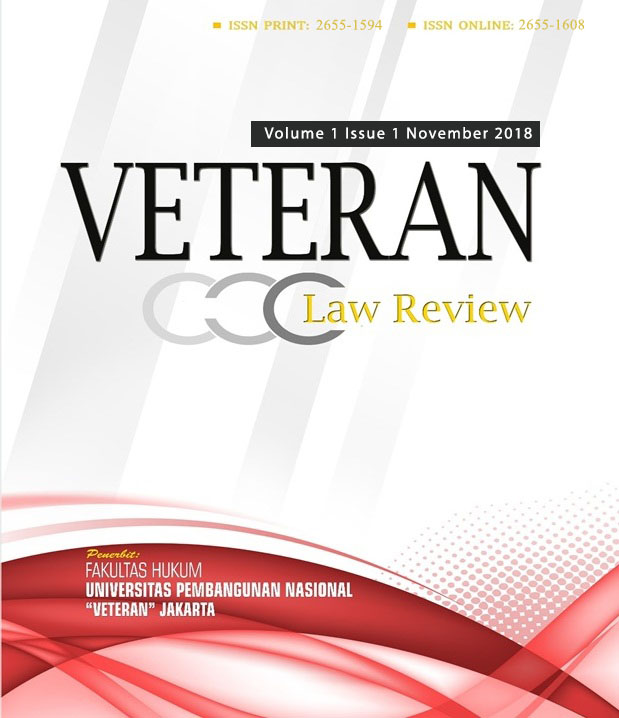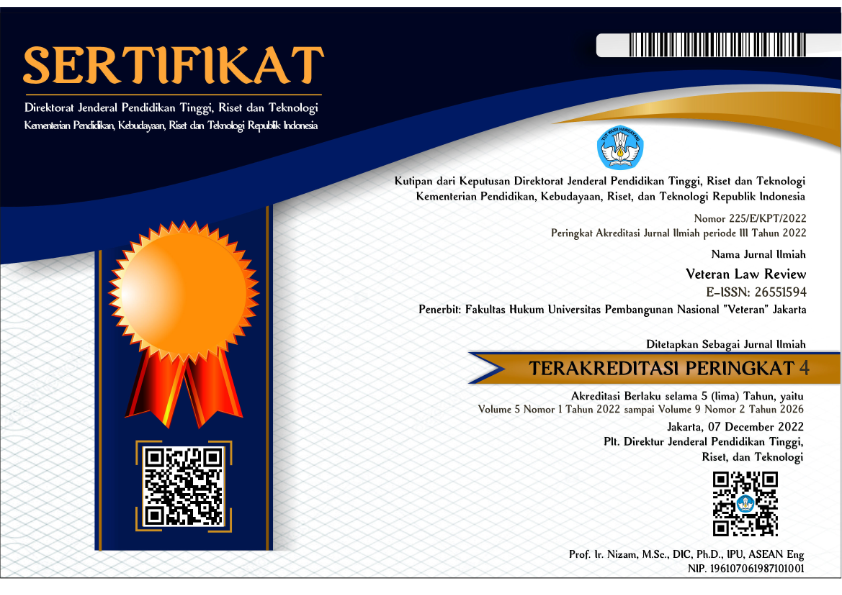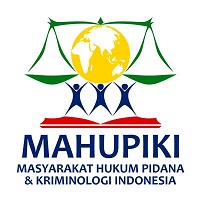The Role Of Judicial Review In Protecting Religious Minority Rights In Indonesia
DOI:
https://doi.org/10.35586/velrev.v1i1.389Abstract
Indonesia is a predominantly Muslim country, and Muslims in this country live in a pluralistic society harmoniously in their daily life. The absence of any reference to Islam in the Constitution shows that Indonesia is open to all religions besides Islam. The harmony of relationship among religious followers is preserved in the Indonesian constitution that acknowledges all of citizens have the religious freedom, which the state has to respect, protect and fulfill. The general idea of preserving the rights of religious freedom lies in the history of protecting religious minorities, and it is universally acceptable as one of the foundations of a democratic society. Therefore, ideally, a law which limits civil rights should never threaten the freedom of thought, conscience and religion, or impose limitations to those rights solely on the grounds of religious, political or other views. If the notion of protecting rights is as such, then the question arises is what mechanism can protect human rights as constitutional rights of citizens? The best legal mechanism in this context is to challenge the state and constitutional issues through the courts by means of the judicial review. This paper examines whether the judicial review as one of the best mechanisms to protect constitutional rights of citizens can be a concrete way to deal with human rights protection by challenging the state through the court. This paper concludes that the judicial review of executive acts and legislative power is very likely to be able to protect religious minority rights in Indonesia.Downloads
References
Ackermann, L. W. H. (1990). “Constitutional Protection of Human Rights: Judicial Review”. Columbia Human Rights Law Review, No. 21 (1989-1990).
Asian Human Rights Commission (AHRC). (2006). “Indonesia: Ratification of Key Human Rights Instruments Must be Followed by Legal Reform”. a Statement by the Asian Human Rights Commission, retrieved from http://www.ahrchk.net/statements/mainfile.php/2006statements/457/
Asshiddiqie, J. (2006). Konstitusi dan Konstitusionalisme Indonesia. Jakarta : Konstitusi Press.
Beatty, D. (1994). “Human Rights and the Rules of Law”, in David M. Beatty (ed), Human Rights and Judicial Review: A Comparative Perspective. London: Martinus Nijhoff Publishers.
Brand, D. (2005). “Introduction to Socio-Economic Rights in the South African Constitution”. in Danie Brand and Christof Heyns (eds), Socio-Economic Rights in South Africa, Pretoria: Pretoria University Law Press.
Carrese, P. O. (1998). “Judicial Statesmanship, the Jurisprudence of Indovidualism, and Tocqueville’s Common Law Spirit”. The Review of Politics, (Vols. 60, No. 3, pp. 465-495).
Crouch, M. (2007). “Regulating Places of Worship in Indonesia: Upholding Freedom of Religion for Religious Minorities?”. Singapore Journal of Legal Studies, pp. 96-116.
Dworkin, R. (1999). Freedom’s Law: The Moral Reading of the American Constitution. Cambridge, Massachusetts: Harvard University Press.
Editors. (1994). “Constitutional Complaints: The European Perspective”. International and Comparative Law Quarterly, (Vols. 43).
Electronic Resource Centre for Human Rights Education, retrieved from http://www.hrea.org/erc/Library/First_Steps/part1_eng.html
Faruq, S. S. (1999). ‘Human rights and the Constitution’. in Ramdas Tikamdas and S.S. Rachgan (eds), Human Rights and the National Commission. Kuala Lumpur: Hakam.
Gvosdev, N. K. (2001). “Constitutional Doublethink, Managed Pluralism and Freedom of Religion”. Religion, State & Society, (Vols. 29, No. 2).
Hathaway, O. A. (2002). “Do Human Rights Treaties Make a Difference?”. The Yale Law Journal 111: 1935-2042.
Horowitz, D. L. (2006). “Constitutional Courts: A Primer for Decision Makers”. Journal of Democracy, (Vols. 17), No. 4, pp. 125-137, retrieved from http://muse.jhu.edu/journals/journal_of_democracy/v017/17.4horowitz.html
Hosen, N. (2007). Shari’a and Constitutional Reform in Indonesia. Singapore: ISEAS.
Keith, L. C. (2002). “Judicial Independence and Human Rights Protection around the World.” Judicature, (Vols. 85, No. 4, pp. 195 – 200).
Kipp, R. S., & Rodgers, S. (1987). “Introduction: Indonesian Religions in Society”. in Rita Smith Kipp & Susan Rodgers (eds), Indonesian Religions in Transition, Tucson: University of Arizona Press.
Klucka, J. (1997). “Suitable Rights for Constitutional Complaint”. Workshop on “the Functioning of the Constitutional Court of the Republic of Latvia”, European Commission for Democracy through Law, Riga, Latvia, 3-4 July 1997, retrieved from: http://www.venice.coe.int/docs/1997/CDL-JU(1997)019-e.pdf
Landman, T. (2005). Protecting Human Rights: A Comparative Study. Washington DC: Georgetown University Press, p. 60.
Lewis, C. B. (2004). Judicial Remedies in Public Law. (Vols. 2). London: Sweet & Maxwell.
Macklem, P. (2007). “What is International Human Rights Law? Three Applications of a Distributive Account”. Bernard and Audre Rapoport Center for Human Rights and Justice University of Texas School of Law, November 19, 2007, retrieved from http://www.utexas.edu/law/academics/centers/humanrights/publications/macklem_texas_paper.pdf
Maduna, P. M. (1990). “Judicial Review and Protection of Human Rights Under a New Constitutional Order in South Africa”. Columbia Human Rights Law Review, No. 21 (1989-1990).
Muryanto, B. (2015). “Islamic Jihad Front disperses Christian camp in Yogyakarta”. The Jakarta Post Online, Fri, July 03 2015, retrieved from http://www.thejakartapost.com/news/2015/07/03/islamic-jihad-front-disperses-christian-camp-yogyakarta.html
Sadurski, W. (2005). Rights before Courts: A Study of Constitutional Courts in Post-Communist States of Central and Eastern Europe. The Netherlands: Springer.
Salim, A. (2007). “Muslim Politics in Indonesia’s Democratization: The Religious Majority and the Rights of Minorities in the Post-New Order Era”. in Ross H. McLeod and Andrew MacIntyre, Indonesia: Democracy and the Promise of Good Government, Singapore: ISEAS.
Setunga, P. (2008). “Religious Freedom not Secure in Indonesia”. World Wide Religious News (WWRN): Asia/Pacific–Indonesia/Brunei, retrieved from http://www.wwrn.org/article.php?idd=28810&sec=61&con=19
Stahnke, T., & Robert C. B. (2005). “The Religion-State Relationship and the Right to Freedom of Religion or Belief: A Comparative Textual Analysis of the Constitution of Predominantly Muslim Countries”. Georgetown Journal of International Law, (Vols. 36, pp. 947-1078).
The Tandem Project, United Nations, Human Rights & Freedom of Religion or Belief. (2008). from
http://www.tandemproject.com/issue_statements/statements/072408_upr_files/072408_upr.pdf
U.S. Department of State, Bureau of Democracy, Human Rights and Labour. (2008) Annual Report on International Religious Freedom: Indonesia, retrieved from http://www.state.gov/g/drl/rls/irf/2008/108407.htm
U.S. Department of State, Bureau of Democracy, Human Rights and Labour. (2008). Annual Report on International Religious Freedom: Indonesia, retrieved from http://www.state.gov/g/drl/rls/irf/2008/108407.htm
U.S. Department of State, Bureau of Democracy, Human Rights and Labour. (2007). Annual Report on International Religious Freedom: Indonesia, retrieved from http://www.state.gov/g/drl/rls/irf/2007/90137.htm
U.S. Department of State, Bureau of Democracy, Human Rights and Labour. (2005). Annual Report on International Religious Freedom: Indonesia, retrieved from http://www.state.gov/g/drl/rls/irf/2005/51512.htm
UN General Assembly Resolution 719 (VII)., & UN General Assembly Resolution 285 (111). (1953 &1949).
United Nation Development Program, “Integrating Human Rights with Sustainable Human Development: A UNDP Policy Document 1998”, retrieved from: http://www.undp.org/governance/docs/HR_Pub_policy5.htm
Waldron, J. (1998). “Judicial Review and the Conditions of Democracy”. The Journal of Political Philosophy, (Vols. 6, N. 4, pp. 335-355).
Witte, J. J., & Vyver, V. D. D. (1996). Religious Human Rights in Global Perspeective: Legal Perspective. The Hague: Martinus Nijhoff Publishers.
Zhang, Y. (1995). “Comparative Studies on Judicial Review in East and Southeast Asia”. IIAS Symposium, 31 August–1 September, 1995, Leiden, The Netherlands: from http://www.iias.nl/iiasn/iiasn6/iiasnews/zhang.html
Downloads
How to Cite
Issue
Section
License
Copyright (c) 2022 Veteran Law Review Journal
Veteran Law Review © 2022 by Faculty of Law Universitas Pembangunan Nasional "Veteran" Jakarta is licensed under Creative Commons Attribution 4.0 International

1. License
The non-commercial use of the article will be governed by the Creative Commons Attribution license as currently displayed on Creative Commons Attribution 4.0 International.
2. Author(s)' Warranties
The author warrants that the article is original, written by the stated author(s), has not been published before, contains no unlawful statements, does not infringe the rights of others, is subject to copyright that is vested exclusively in the author, and free of any third party rights, and that any necessary written permissions to quote from other sources have been obtained by the author(s).
3. User/Public Rights
VELREV's spirit is to disseminate articles published are as free as possible. Under the Creative Commons Attribution-ShareAlike 4.0 International License. VELREV permits users to copy, distribute, display, and perform the work for non-commercial purposes only. Users will also need to attribute authors and VELREV to distributing works in the journal and other media of publications.
4. Rights of Authors
Authors retain all their rights to the published works, such as (but not limited to) the following rights;
- Reproduce the work
- Prepare derivative works based upon the work
- Distribute copies of the work
- Perform the work publicly
- Display the work publicly
- Copyright and other proprietary rights relating to the article, such as patent rights,
- The right to self-archive the article,
- The right to enter into separate, additional contractual arrangements for the non-exclusive distribution of the article's published version (e.g., post it to an institutional repository or publish it in a book), with an acknowledgement of its initial publication in this journal (Veteran Law Review).
5. Co-Authorship
If the article was jointly prepared by more than one author, any author submitting the manuscript warrants that he/she has been authorized by all co-authors to be agreed on this copyright and license notice (agreement) on their behalf, and agrees to inform his/her co-authors of the terms of this policy. VELREV will not be held liable for anything that may arise due to the author's internal dispute. VELREV will only communicate with the corresponding author.
6. Royalties
Being an open accessed journal and disseminating articles for free under the Creative Commons license term mentioned, author(s) are aware that VELREV entitles the author(s) to no royalties or other fees.
7. Miscellaneous
VELREV will publish the article (or have it published) in the journal if the article’s editorial process is successfully completed. JOSI's editors may modify the article to a style of punctuation, spelling, capitalization, referencing, and usage that deems appropriate. The author acknowledges that the article may be published so that it will be publicly accessible and such access will be free of charge for the readers as mentioned in point 3.


















